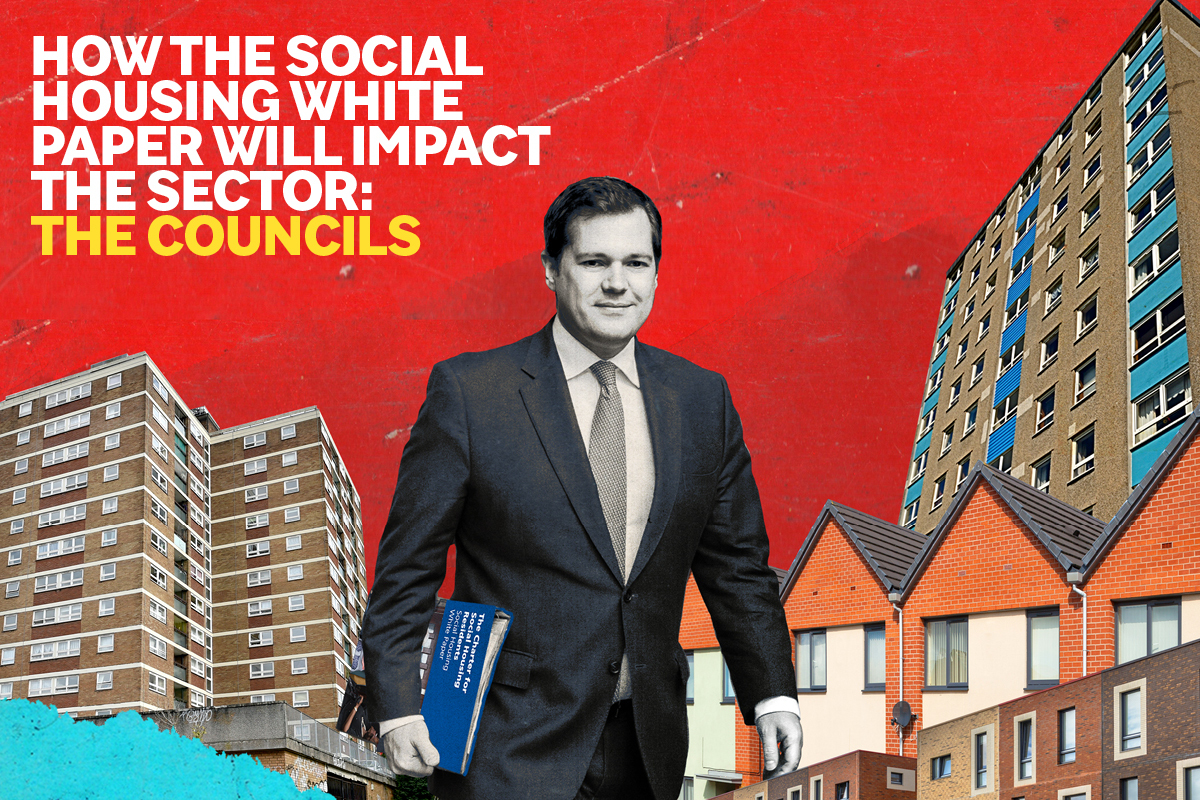You are viewing 1 of your 1 free articles
How the Social Housing White Paper will impact the sector: the councils
Social Housing White Paper announcements could have major implications for the England’s 165 or so stock-retaining local authorities. We’ve spoken to the experts about where proposals could have the biggest effects on council housing services.
Playing catch-up
The most significant change promised by the white paper is a shift back to proactive regulation of consumer standards in social housing – as opposed to the current regime, which reacts when there are serious concerns.
A whole new function of the Regulator of Social Housing (RSH) will be to inspect all social landlords, including councils, every four years. The RSH will also assess landlords against a new core set of tenant satisfaction measures.
Kelsey Walker, a director at Savills Housing Consultancy who worked at the regulator, expects this to pose a particular challenge for local authorities – a consumer standards breach at a local authority hasn’t come with the threat of the governance downgrades that can affect the organisation more widely that housing associations have faced.
“I think there’s always a view that local authorities didn’t take it as seriously”
“I think there’s always a view that local authorities didn’t take it as seriously,” she says.
Linda Convery, partner at law firm TLT, also suspects the new tenant satisfaction measures “may be a big step” for councils, which are not currently required explicitly to test this regularly.
That suggestion may be supported by the fact that the RSH identified potential for “serious detriment” to tenants in a record 15 cases in 2019/20 – with the increase driven by complaints relating to local authority landlords, of which there were seven.
Indeed, the white paper specifies that the duty to self-refer when potential consumer standards issues are uncovered, which currently only applies to housing associations, will be extended to councils.
But John Bibby, chief executive of the Association of Retained Council Housing, is less concerned. “I think councils have done an awful lot in the last couple of years to look at themselves,” he argues. “Clearly, local authorities haven’t had the same engagement with the regulator that housing associations have over the past few years, but authorities are quick learners and I don’t see that as a major problem.”
Resourcing issues
Whether or not councils can grapple effectively with the principles of the new regime, cost – as ever – may be a particular issue for this part of the sector.
Some Housing Revenue Accounts are already very finely balanced as councils try to juggle major bills associated with fire safety, decarbonisation and water charges compensation payouts – a task Darren Rodwell, leader of Barking and Dagenham Council and executive member for housing at London Councils, describes as “mission impossible”. Without extra investment from the government, Mr Rodwell warns, “it’s hard to see how the sector can make the changes we all want to achieve”. No such investment has yet been promised.
The make-up of council housing stocks, as opposed to housing associations’, may exacerbate the issue. “Many of us have particular challenges around old housing stock and skyrocketing repair bills,” adds Mr Rodwell. That means dealing with a mouldy flat could be more likely to require significant structural work to an entire ageing block.
“These aren’t the sorts of issues that can be fixed on the cheap – and we’ll make this clear to ministers.”
Bearing that in mind, the white paper pledges a review of the Decent Homes Standard. Local authorities in particular will be watching closely to see whether new requirements are matched with additional funding.
Named persons
One or two details in the new regulatory world envisioned by the government may give councils particular pause for thought.
For instance, the white paper promises legislation “to place an obligation on landlords to identify and publicise a senior named person in their organisation who is responsible for ensuring compliance with their health and safety obligations”. In addition, the RSH will be expected to demand that social landlords “identify a ‘responsible person’ for consumer standards compliance, as part of a wider requirement to provide greater clarity on the roles and responsibilities of senior staff”.
Eamon McGoldrick, managing director of the National Federation of ALMOs, posits that choosing who fulfils this role may be less straightforward for local authorities.
“If you’re a housing association, everyone knows the chief executive is in charge. But councils must decide whether that lies with councillors or with officers,” he says.
ALMOs
Among the most intriguing snippets from the white paper were its passages relating to ALMOs. These council-owned housing management companies are dwindling in number but are still responsible for hundreds of thousands of homes across England. Their reputation has taken rather a bashing in recent years, with Grenfell Tower managed by an ALMO and health and safety issues later emerging at The Gateshead Housing Company and East Kent Housing.
The white paper pledges legislation “to make it explicit that provisions in contracts between local authorities and [ALMOs] or tenant management organisations would be deemed void if they hindered the [RSH] in its exercise of its powers”. Before that, councils with ALMOs will be asked “to review their contracts to ensure they do not hinder the Regulator of Social Housing in its exercise of its powers”. For Ms Convery, these measures indicate this is a “serious” issue for government.
“Among the local authority sector, I think we’ve got a little bit of an advantage here”
But Mr McGoldrick says he has never come across an example of an ALMO management agreement that would obstruct the regulator from getting involved. “I think this will be about adding a couple of paragraphs in those agreements to make it absolutely clear,” he suggests. The aim, Mr McGoldrick predicts, won’t be to scrap ALMOs as soon as a regulatory notice is issued, but to ensure the RSH can engage “if the council and the ALMO are pointing fingers”.
To bring things full circle, Mr McGoldrick is optimistic about ALMOs’ ability to handle the new proactive consumer regulation regime, having been born from a similar approach in the early 2000s.
“Among the local authority sector, I think ALMOs have got a little bit of an advantage here, having been there before with the Audit Commission and being so focused on housing management,” he suggests.










